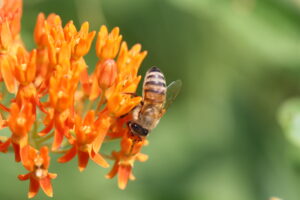By bernheim
 European honey bee, apis mellifera, commonly called the western honey bee is the most common of the seven to twelve species of honey bee worldwide.
European honey bee, apis mellifera, commonly called the western honey bee is the most common of the seven to twelve species of honey bee worldwide.
Bees are remarkable little insects that have been around for about 100 million years, going quietly and efficiently about their business of gathering their food from the nectar and pollen produced by flowers. In doing so, bees perform a valuable and vital service to the plants they visit, and ultimately, to human beings and other animals. They aid pollination through their foraging activities and thus ensure the spread and continuation of plant species that are necessary to a healthy ecosystem.
The western honey bee that lives in and visits Bernheim is beneficial to our flowers and vegetables grown in the Edible Garden. Living in hives in locations throughout Bernheim, they build the internal structures of their homes, protecting and tending to one another’s needs, while laying in food stocks to tide the colony over in leaner times. This very food – honey – is another reason why bees are so important to us; for the precious substance has been proven to provide nutritional and medical benefits.
-Darrell Hester, Bernheim Ranger

